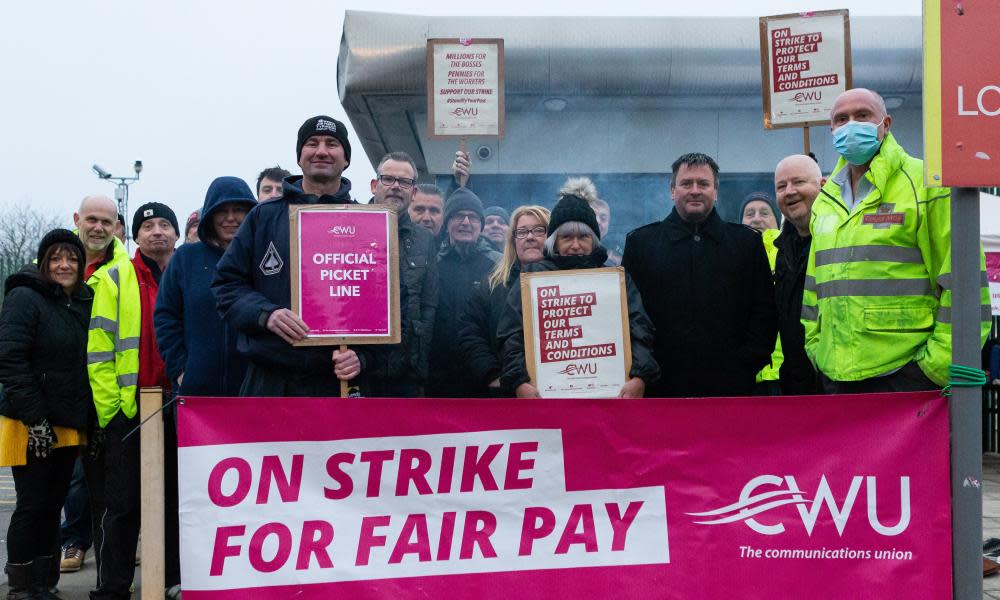Royal Mail and CWU trade accusations as strike turns increasingly bitter

A fresh war of words has escalated the bitter dispute at Royal Mail, as union leaders across the communications, rail, health and education sectors said that only fair pay and job security can end the UK’s waves of strike action.
Dave Ward, the secretary general of the Communication Workers Union, which is midway through a series of strikes running up to Christmas, accused bosses of “goading” members and creating “a psychological attack” on postal workers.
Royal Mail wrote to Ward demanding he intervene to end alleged violence and “a culture of intimidation on the picket line”. Royal Mail said it had received more than 100 reports or allegations of “unacceptable behaviour” in four months, of which 35 had been reported to the police.
The company said more than 10,000 staff chose to work during strikes on Wednesday and Thursday, and it had a responsibility to “ensure they can do so safely and without risk of harm”.
Ward said the CWU did not accept the portrayal of the strikes, but added: “If you’re dealing with 120,000 people who are taking strike action, you’re bound to get the odd issue.”
A Royal Mail spokesperson said: “This behaviour has no place in any civilised workplace. The direct intervention of the CWU’s general secretary is needed to end this culture of intimidation on the picket line, including many incidents by CWU representatives.”
Thompson has previously accused CWU members of “extraordinary behaviours”, saying: “We’ve had allegations of racism, we’ve had allegations of sexism, we’ve had people threatened with violence … It’s an extraordinary situation and it’s not something that we will ever tolerate.”
Speaking on Sky News, Ward hit out at the Royal Mail chief executive Simon Thompson’s use of social media to “goad our members”, adding: “He’s brought in a team of union and worker busters and they’re deliberately creating a psychological attack on every single worker.”
Unions would need “decent pay for our members, a fair settlement, a future in the company that the members believe in” to end the dispute, he said.
Instead they were “faced with the most brutal attack on jobs that any group of workers has seen in the UK for decades”, Ward said. “It’s also an attack on the service. They want to turn Royal Mail into just another parcel courier.”
The dispute is just one of a number threatening a bleak December for workers and services in Britain, with teachers, nurses and rail staff all forgoing salary and striking this month, and others in the health and education sectors also having voted for action.
Downing Street has set up a dedicated unit to give a coordinated response over the waves of action that could recreate the “winter of discontent” of 1978-79, as the crisis grows. The Cabinet Office minister Oliver Dowden has been delegated by Rishi Sunak to plan for how the government responds to growing industrial unrest.
Speaking alongside Ward on Sky, other union representatives said they believed a settlement would eventually be reached in their sectors but said pay and working conditions had to be addressed.
Dr Mary Bousted, the joint general secretary of the National Education Union, said about 40% of teachers were “leaving the profession within 10 years, ground down by overwork and poor pay”.
Dr Emma Brunswick, the deputy chair of British Medical Association, said unions wanted to help resolve the crisis in the NHS, but added that the pay of health staff had fallen by a quarter in real terms in recent years.
Eddie Dempsey, the senior assistant general secretary of the RMT, said the tone had changed since the appointment of a new transport secretary, Mark Harper, who met Mick Lynch, the union’s general secretary, last week and said he wanted to help facilitate a deal. But Dempsey added that talks had lasted months and on more than one occasion the rug had been “pulled out from under our feet”.

 Yahoo Movies
Yahoo Movies 
